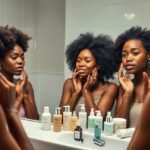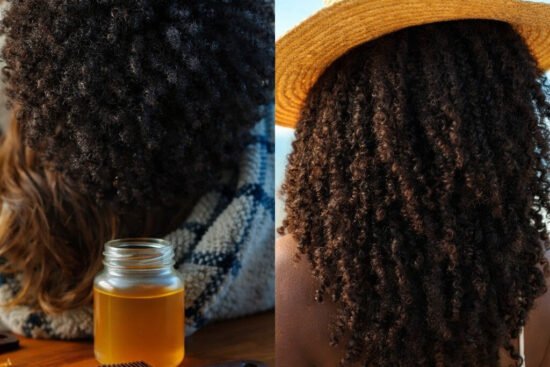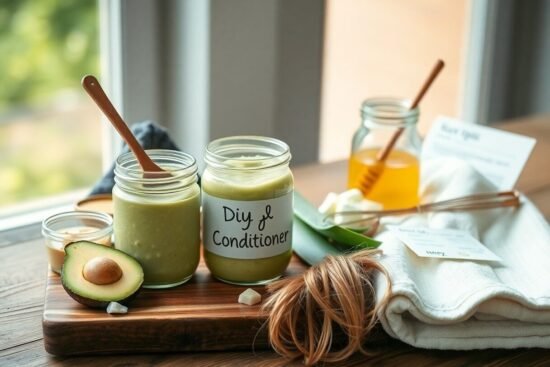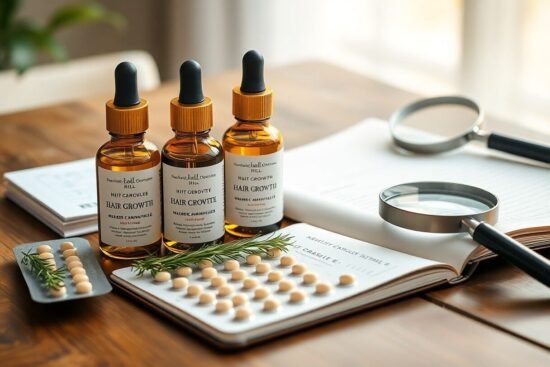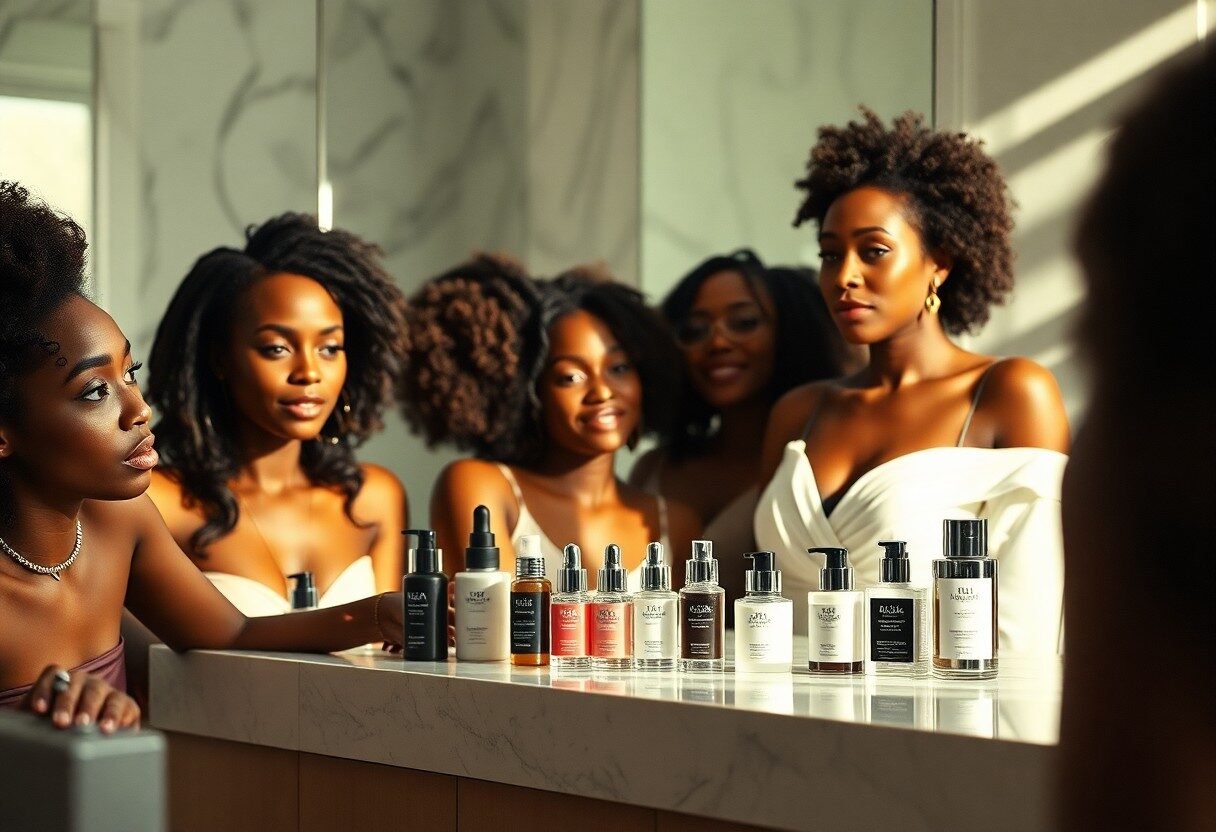
You deserve a skincare routine tailored specifically for your unique skin needs. In this post, I will guide you through the crucials of cleansers, serums, and moisturizers designed for Black women, highlighting products that work wonders for melanin-rich skin. It’s important to understand that your skin can be more prone to dryness and hyperpigmentation, making the right choices vital for maintaining a healthy radiance. Join me in discovering effective ingredients and formulations that will elevate your skincare game and help you glow confidently.
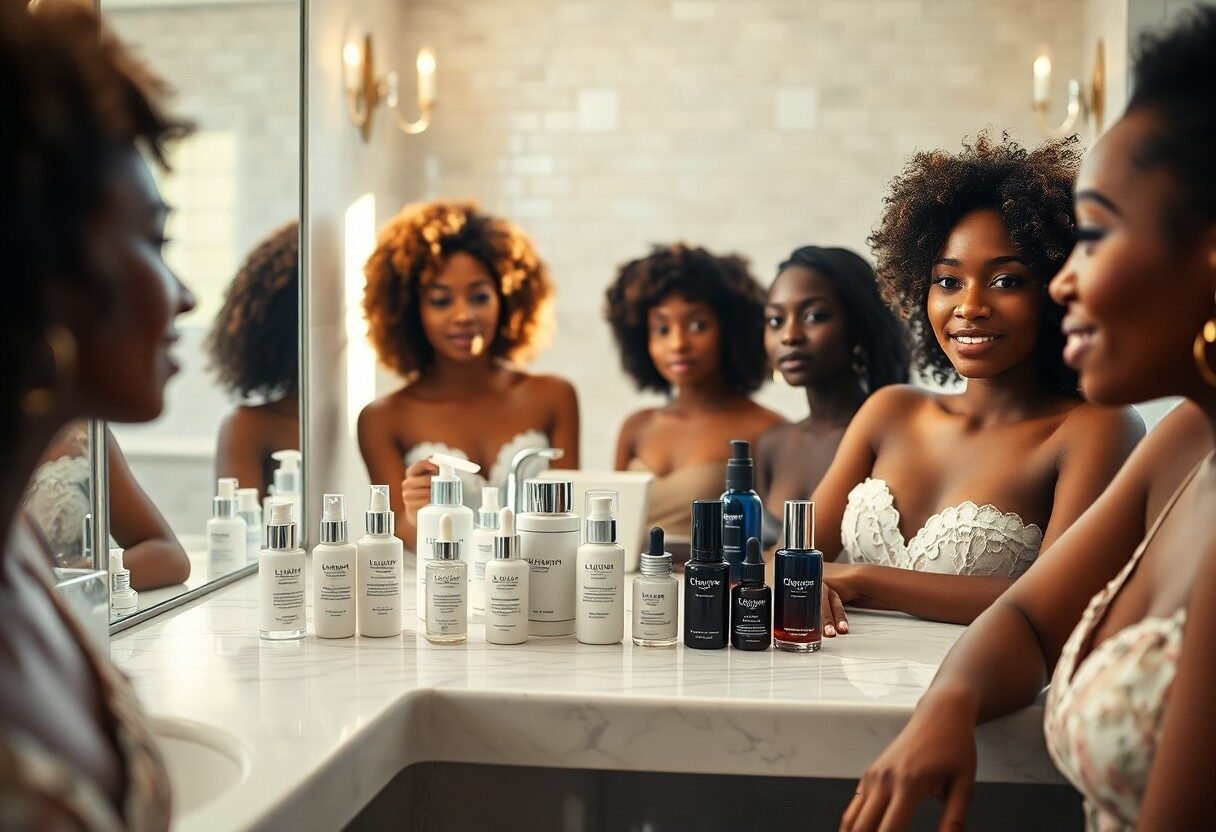
Key Takeaways:
- Choose cleansers that are gentle and hydrating to avoid stripping natural oils from the skin.
- Look for serums containing ingredients like vitamin C, hyaluronic acid, or niacinamide to target specific skin concerns.
- Moisturizers should be rich in emollients and occlusives to provide adequate hydration and lock in moisture.
- Pay attention to products that cater to the unique needs of melanin-rich skin to enhance overall radiance.
- Test products on a small patch of skin to ensure compatibility, especially when introducing new ingredients.
- Consider factors such as climate and lifestyle, as they can influence hydration needs and product effectiveness.
- Regularly assess your skincare routine to adapt to changing skin conditions and seasonal variations.
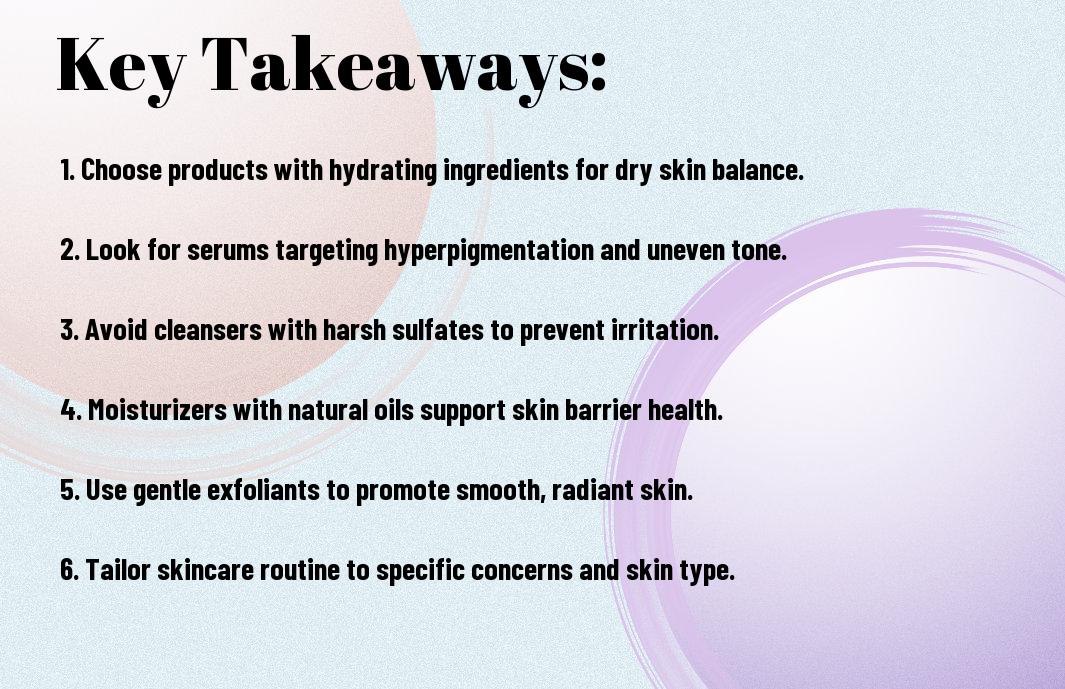
Unpacking Unique Skin Needs
Melanin-Rich Skin Characteristics
Melanin-rich skin offers some natural advantages such as a lower incidence of skin cancer and a youthful appearance due to its thicker dermis, which generally improves elasticity. However, its unique structure can also lead to increased oiliness and a tendency toward hyperpigmentation. This is why understanding the specific needs of your skin type is vital in selecting the right products for cleansing, moisturizing, and treating.
Common Skin Concerns in Black Women
Hyperpigmentation, dry patches, and acne scarring are among the prevalent skin issues I often encounter. These concerns are not just superficial; they can significantly impact self-esteem and confidence. While every skin type is distinct, there are specific attributes and common challenges that many black women share.
Hyperpigmentation emerges frequently due to post-inflammatory responses or sun exposure; approximately 60% of black women report struggles with uneven skin tone. Additionally, the prevalence of conditions like adult acne, exacerbated by hormonal changes, affects nearly 50% of women in this demographic. Addressing these concerns requires targeted treatments using products rich in ingredients like vitamin C, kojic acid, and niacinamide, which help brighten and even out skin tone. Adopting a consistent skincare routine that caters to these unique needs is necessary for achieving a radiant complexion.
The Cleansing Ritual: Choosing Your First Step Wisely
The Importance of Gentle Cleansing
Gentle cleansing is vital for maintaining the health of your skin. Overly aggressive cleansers can strip away natural oils, leading to dryness and irritation, particularly for melanin-rich skin. Using a mild cleanser preserves your skin’s barrier function while effectively removing impurities and buildup without compromising your skin’s moisture levels.
Types of Cleansers Best Suited for Black Skin
Choosing the right cleanser can significantly impact your skin’s overall appearance and health. For Black skin, I recommend opting for hydrating or cream-based cleansers that will not only cleanse but also nourish the skin. Products containing glycerin or imperative oils can be particularly beneficial, as they help maintain hydration while cleansing. Additionally, avoid harsh sulfates that can lead to further skin issues. Here’s a breakdown of various cleanser types:
| Cleanser Type | Key Benefits |
| Cream Cleansers | Moisturizing; ideal for dry skin. |
| Foam Cleansers | Deep cleansing; suitable for oily skin. |
| Oil Cleansers | Effective at removing makeup; hydrating. |
| Micellar Water | Gentle; great for sensitive skin. |
| Gel Cleansers | Refreshing; ideal for combination skin. |
Exploring specific cleansers that match your skin type is a game changer. For instance, cream cleansers work wonders for those prone to dryness as they provide moisture with each wash. On the other hand, oil cleansers are an excellent choice for individuals struggling with makeup removal, as they emulsify grime without stripping the skin. Overall, these options ensure that you’re not only cleansing but also nurturing your skin. Any of these options can elevate your skincare routine.
- Cream cleansers provide hydration.
- Foaming cleansers clear oil effectively.
- Oil cleansers assist in makeup removal.
- Micellar waters cater to sensitive skin.
- Gel cleansers offer refreshing properties.
The Role of Serums: Targeting Specific Skin Challenges
Key Ingredients for Hyperpigmentation and Uneven Skin Tone
For hyperpigmentation, look for serums containing vitamin C, which brightens dark spots, or niacinamide, known for evening out skin tone. Alpha arbutin is another powerhouse, effectively discouraging melanin production. Regular use can help diminish the appearance of dark spots while promoting a more uniform complexion, important for embracing your natural beauty.
Hydrating Vs. Brightening Serums: What You Need to Know
Deciding between hydrating and brightening serums depends on your skin’s unique needs. If parched skin is an issue, hydrating serums often feature ingredients like hyaluronic acid or squalane to boost moisture. Alternatively, if you’re battling uneven skin tone or dark spots, you might opt for brightening serums infused with ingredients like kojic acid or licorice extract, which specifically target pigmentation.
Moisturization Mastery: Locking in Essential Hydration
Understanding the Humectants, Emollients, and Occlusives
Humectants, emollients, and occlusives are the three pillars of effective moisturization. Humectants like glycerin and hyaluronic acid draw water into the skin, providing hydration. Emollients, such as shea butter and jojoba oil, smooth and soften the skin barrier. Occlusives, like petrolatum or coconut oil, form a protective layer that locks in moisture. Combining these ingredients can create a well-rounded moisturizer, especially crucial for the unique needs of Black women’s skin.
Finding the Right Moisturizer for Your Skin Type
Your skin type plays a significant role in selecting the perfect moisturizer. For those with oily skin, lightweight gels containing humectants work wonders without clogging pores. On the other hand, dry skin can benefit from cream-based moisturizers filled with emollients and occlusives to give a robust hydration boost. Combination skin demands a balance, while sensitive skin thrives on fragrance-free products with soothing ingredients like aloe vera.
Exploring the right options for your skin type paves the way for achieving hydrated, healthy skin. If you find your complexion feels tight or looks dull, you might lean toward richer formulas loaded with nourishing oils. For oily and breakout-prone skin, look for non-comedogenic products labeled as oil-free; these maintain hydration without exacerbating excess shine. Conducting a patch test can also help you identify any potential irritants in your moisturizer, so your skin receives only the love it deserves.
Layering Products: The Art of Combining Cleansers, Serums, and Moisturizers
A Step-by-Step Guide to Proper Layering
Effective layering of skincare products can transform your routine into a powerhouse of nourishment. Start with a gentle cleanser to remove impurities, then apply your chosen serum while your skin is still damp, allowing for better absorption. Follow up with a suitable moisturizer to seal in all that goodness. Finally, if you’re using any facial oils, add them last to lock in moisture and provide a protective barrier.
Step-by-Step Layering Guide
| Step 1: Cleanser | Use a gentle cleanser to remove makeup and dirt. |
| Step 2: Toner (if used) | Apply toner to balance and prep the skin. |
| Step 3: Serum | Apply your serum while skin is damp for enhanced absorption. |
| Step 4: Moisturizer | Seal in the serum with an appropriate moisturizer. |
| Step 5: Facial Oil | Apply face oil last to lock in moisture and add a barrier. |
Common Mistakes to Avoid in Your Skincare Routine
Many of us fall into the trap of layering too many products, or worse, using them in the wrong order. Overloading your skin can lead to clogged pores and irritation, while improper sequencing can hinder the absorption of key ingredients. Staying consistent with your routine and adjusting according to your skin’s needs is vital.
Common pitfalls include skipping important steps like cleansing or applying products too quickly without allowing previous layers to absorb. Using products with conflicting ingredients, such as retinol and vitamin C together in the morning, can also reduce their efficacy. Additionally, neglecting to tailor your routine to your unique skin type and its specific needs often leads to lackluster results. Observing how your skin responds and tweaking your regimen accordingly will provide you with a far more rewarding skincare experience.
Tailoring Your Regimen for Seasonal Changes
How Weather Influences Skin Care Needs
The shift in seasons directly impacts your skin’s hydration and protection requirements. In winter, for instance, cold air can strip moisture from your skin, making it feel dry and tight. Conversely, summer heat often means increased sebum production, leading to breakouts. Understanding these changes helps you fine-tune your regimen to maintain optimal skin health all year round.
Adjusting Your Products Throughout the Year
Adapting your skincare products seasonally can be a game changer for maximizing your skin’s vitality. I find that in the colder months, rich and emollient moisturizers serve to lock in hydration, while switching to lighter formulations in warmer weather prevents excess oiliness. Incorporating antioxidants in summer adds a protective layer against UV damage, whereas a deep cleanser may be necessary after winter’s dryness.
As the seasons transition, I assess the performance of my products based on how my skin reacts to environmental shifts. In summer, I might swap out my creamy cleanser for a gel-based option that offers a refreshing cleanse without stripping important oils. Shifting from a heavier night cream to a more lightweight gel moisturizer keeps my skin from feeling suffocated. For fall, introducing serums packed with hyaluronic acid helps combat the dry air moving in, while I often rely on thicker, occlusive products during winter nights to prevent moisture loss. Every year, I take note of my skin’s response, allowing me to tweak my regimen accordingly for the best results. Your skin deserves to feel and look its best, no matter the season!
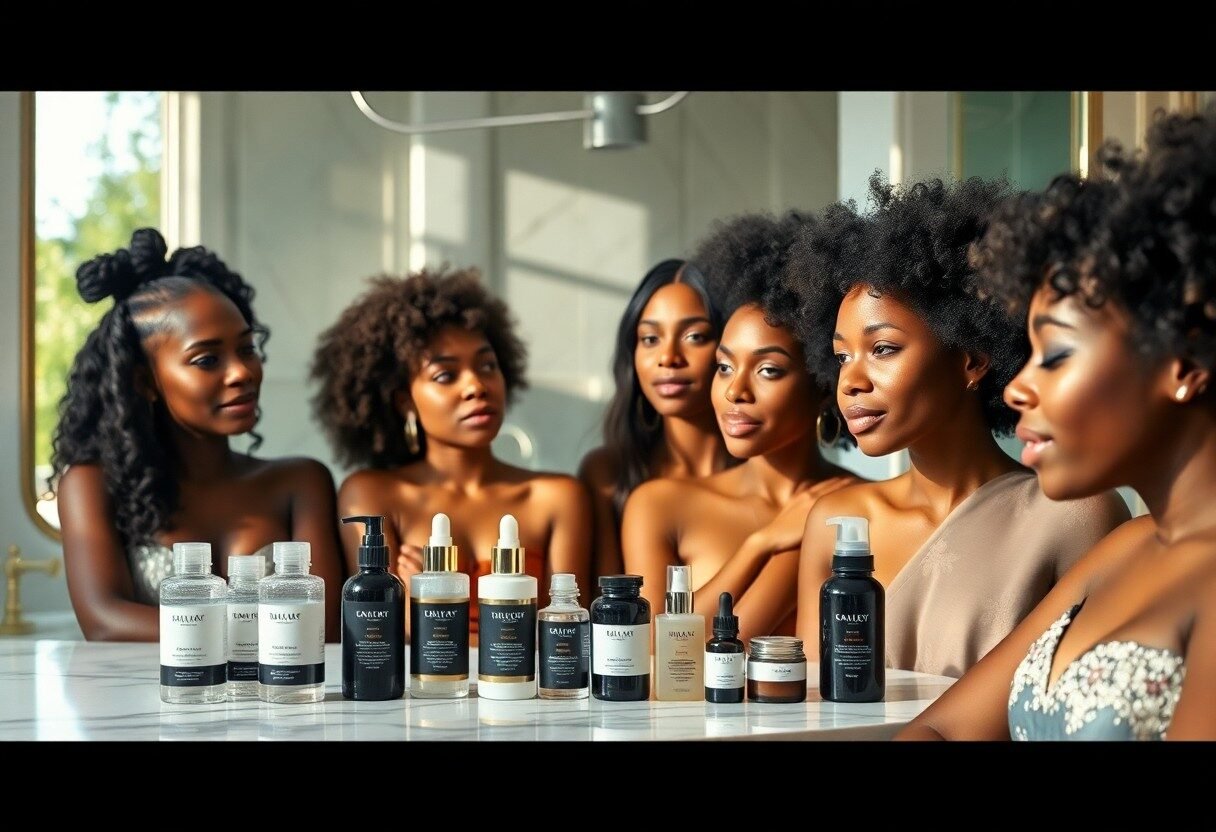
Spotlight on Clean Beauty: The Importance of Ingredient Transparency
Navigating Labels: Ingredients to Avoid
Identifying harmful ingredients can be overwhelming, but some key components to watch out for include parabens, sulfates, and synthetic fragrances. Parabens are often used as preservatives but have been linked to hormone disruption. Sulfates can strip your skin and hair of natural oils, leading to dryness and irritation. Additionally, synthetic fragrances can trigger allergic reactions or sensitivities. Opting for products that clearly list ingredients helps safeguard your health.
Benefits of Choosing Natural and Organic Products
Natural and organic products are typically free from harsh chemicals, promoting skin health rather than compromising it. These formulations use plant-derived ingredients, which means they are more aligned with your body’s natural processes. As a bonus, they often contain powerful antioxidants and anti-inflammatory properties that nourish and protect your skin.
Engaging with clean beauty allows you to embrace products with integrity. Many natural brands embrace transparency, openly communicating their ingredient sourcing and production practices. You won’t just be protecting your skin; you’re also supporting sustainable practices and reducing your chemical exposure. Moreover, studies show that consumers who choose organic have reported improved skin conditions and vitality. By investing in clean beauty, you promote not only your health but also a thriving ecosystem.
Cultural Influences on Skincare: Traditions and Trends Among Black Women
Historical Practices and Their Modern Interpretations
Traditional practices among Black women, often passed down through generations, included the use of natural ingredients like shea butter and coconut oil. These practices emphasized hydration and protection, aligning closely with modern formulations that prioritize moisture and natural components. For instance, I often find that my grandmothers’ use of these natural oils still resonates today, inspiring me to incorporate similar elements in my skincare routine while understanding their cultural significance.
The Influence of Community and Social Media on Skincare Choices
The rise of social media platforms has significantly shaped skincare trends within the Black community. With Instagram and TikTok, I see countless influencers sharing their personal routines and product reviews, making it easier to discover new brands and techniques suited for our unique skin types. Many of these influencers celebrate and embrace natural beauty, advocating for authentic self-care practices that resonate deeply with our cultural heritage.
This community-driven approach has transformed how we perceive skincare. Through shared experiences, I’ve noted a marked increase in the desire for inclusivity in product lines and the demand for brands that cater specifically to Black skin. The collective knowledge shared online allows us to challenge beauty standards and promotes the usage of products that truly cater to our skin’s needs. As I engage with these platforms, I find products that not only enhance my skincare routine but also connect me to a broader community that values our cultural beauty traditions.
To wrap up
Hence, understanding your skin’s unique needs as a Black woman is important for selecting the right cleansers, serums, and moisturizers. I encourage you to explore products specifically formulated for melanin-rich skin that address issues like hyperpigmentation and moisture retention. By choosing the right components and tailoring your skincare routine, you can achieve a healthy, radiant complexion that reflects your beauty and confidence. Always listen to your skin, and don’t hesitate to consult with professionals for personalized advice.
FAQ
Q: What type of cleanser is best for Black women’s skin?
A: The best type of cleanser for Black women’s skin typically includes hydrating and gentle formulas that do not strip natural oils. Look for cream-based or gel cleansers with ingredients like glycerin, hyaluronic acid, or natural oils. Avoid harsh soaps that may cause dryness or irritation.
Q: How often should Black women use serums in their skincare routine?
A: Serums can be used daily, both in the morning and at night. It’s important to choose serums that target specific concerns such as hyperpigmentation, dryness, or acne. For optimal results, apply the serum after cleansing and before moisturizing.
Q: What ingredients should Black women look for in moisturizers?
A: Black women should look for moisturizers that contain shea butter, cocoa butter, hyaluronic acid, or jojoba oil. These ingredients help to lock in moisture and improve skin texture. Additionally, products with vitamin E can promote overall skin health.
Q: Can Black women experience dry skin, and how can it be treated?
A: Yes, Black women can experience dry skin, which may be due to environmental factors or skin type. To treat dry skin, use a hydrating cleanser, follow up with a nourishing serum, and apply a rich moisturizer. Incorporating products with occlusive ingredients can help seal moisture in.
Q: How important is SPF for Black women, and which products are best?
A: SPF is important for everyone, including Black women, as it protects against UV rays that can lead to skin damage and hyperpigmentation. Look for broad-spectrum sunscreens with SPF 30 or higher. Formulations that are lightweight and non-greasy often work best for daily wear.
Q: Are there specific products recommended for combating hyperpigmentation in Black women?
A: Yes, products containing ingredients such as vitamin C, niacinamide, licorice root extract, or alpha hydroxy acids (AHAs) can be effective in treating hyperpigmentation. Incorporating these ingredients in serums or treatments can help brighten the skin and reduce dark spots.
Q: How can Black women create a balanced skincare routine with cleansers, serums, and moisturizers?
A: To create a balanced skincare routine, start with a gentle cleanser to remove impurities, follow with a serum tailored to your skin concerns, and finish with a moisturizer that hydrates and protects your skin. It’s advisable to choose products that match your skin type—dry, oily, or combination—to achieve optimal results.

